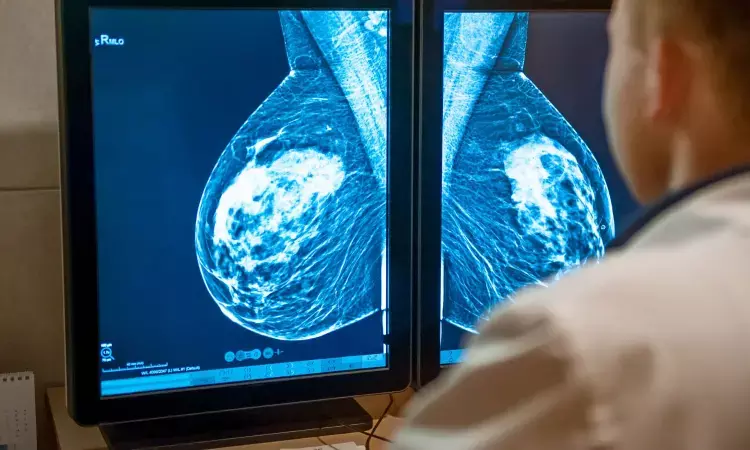- Home
- Medical news & Guidelines
- Anesthesiology
- Cardiology and CTVS
- Critical Care
- Dentistry
- Dermatology
- Diabetes and Endocrinology
- ENT
- Gastroenterology
- Medicine
- Nephrology
- Neurology
- Obstretics-Gynaecology
- Oncology
- Ophthalmology
- Orthopaedics
- Pediatrics-Neonatology
- Psychiatry
- Pulmonology
- Radiology
- Surgery
- Urology
- Laboratory Medicine
- Diet
- Nursing
- Paramedical
- Physiotherapy
- Health news
- Fact Check
- Bone Health Fact Check
- Brain Health Fact Check
- Cancer Related Fact Check
- Child Care Fact Check
- Dental and oral health fact check
- Diabetes and metabolic health fact check
- Diet and Nutrition Fact Check
- Eye and ENT Care Fact Check
- Fitness fact check
- Gut health fact check
- Heart health fact check
- Kidney health fact check
- Medical education fact check
- Men's health fact check
- Respiratory fact check
- Skin and hair care fact check
- Vaccine and Immunization fact check
- Women's health fact check
- AYUSH
- State News
- Andaman and Nicobar Islands
- Andhra Pradesh
- Arunachal Pradesh
- Assam
- Bihar
- Chandigarh
- Chattisgarh
- Dadra and Nagar Haveli
- Daman and Diu
- Delhi
- Goa
- Gujarat
- Haryana
- Himachal Pradesh
- Jammu & Kashmir
- Jharkhand
- Karnataka
- Kerala
- Ladakh
- Lakshadweep
- Madhya Pradesh
- Maharashtra
- Manipur
- Meghalaya
- Mizoram
- Nagaland
- Odisha
- Puducherry
- Punjab
- Rajasthan
- Sikkim
- Tamil Nadu
- Telangana
- Tripura
- Uttar Pradesh
- Uttrakhand
- West Bengal
- Medical Education
- Industry
Dysregulation of lipid profile may increase risk of breast cancer in women with T2DM

A study by Zhang F et al and colleagues entitled "Role of Serum Lipids, Blood Glucose and Blood Pressure in Breast Cancer Risk for Women with Type 2 Diabetes Mellitus" has concluded that lipid profile dysregulation and not the glucose or blood pressure profiles increases the risk of breast cancer with a history of type 2 diabetes mellitus. The study highlights the importance of balancing lipid profiles, particularly total cholesterol and HDL-C.
It is already known that women with T2DM expose women have an increased risk of breast cancer.
In this study, the authors determined the contribution of lipids, glucose and blood pressure to this risk based on the multifactorial nature of T2DM using the Dutch database 2004-2013.
The included women were aged 30-80 years without breast cancer history and were followed up for 1 year. Exposures of interest included total cholesterol, high-density lipoprotein cholesterol (HDL-C), low-density lipoprotein cholesterol (LDL-C), triglycerides, glycated haemoglobin A (HbA1c) and systolic blood pressure (SBP).
The key results of this study are:
In 4.45 years' follow-up, 183/ 10,183 women were diagnosed with breast cancer.
There were U-shaped associations with the incidence of breast cancer for total cholesterol and HDL-C at baseline.
In comparison to moderate elevations, There was a significant association of higher breast cancer risks with high total cholesterol with aHR 1.72 and HDL-C with aHR 1.74 levels.
Researchers found that low total cholesterol and HDL-C levels produced insignificant marginal effects with adjusted hazard ratios of 1.44 and 1.43 respectively.
In comparison to medium levels. Women with high LDL-C levels had more often breast cancer diagnoses.
The study emphasized how important balancing lipid profiles is particularly total cholesterol and HDL-C in real-world data set.
They said, “Dysregulation of the lipid profile, not the glucose or blood pressure profiles increases the breast cancer risk in T2DM women.
Further reading:
https://www.unboundmedicine.com/medline/citation/36718225/full_citation
BDS, MDS in Periodontics and Implantology
Dr. Aditi Yadav is a BDS, MDS in Periodontics and Implantology. She has a clinical experience of 5 years as a laser dental surgeon. She also has a Diploma in clinical research and pharmacovigilance and is a Certified data scientist. She is currently working as a content developer in e-health services. Dr. Yadav has a keen interest in Medical Journalism and is actively involved in Medical Research writing.
Dr Kamal Kant Kohli-MBBS, DTCD- a chest specialist with more than 30 years of practice and a flair for writing clinical articles, Dr Kamal Kant Kohli joined Medical Dialogues as a Chief Editor of Medical News. Besides writing articles, as an editor, he proofreads and verifies all the medical content published on Medical Dialogues including those coming from journals, studies,medical conferences,guidelines etc. Email: drkohli@medicaldialogues.in. Contact no. 011-43720751


